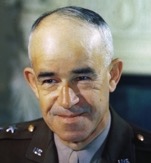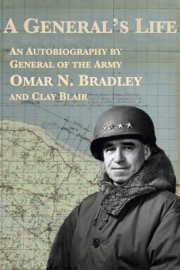
After the US entered World War II, Bradley oversaw the transformation of the 82nd Infantry Division into the first American airborne division. He received his first front-line command in Operation Torch in North Africa, serving under General George S. Patton. After Patton was reassigned, Bradley commanded II Corps in the Tunisia Campaign and the Allied invasion of Sicily. He commanded the First US Army during the Invasion of Normandy, which landed at Utah and Omaha beaches. After the breakout from Normandy, he took command of the Twelfth US Army Group, which ultimately comprised 43 divisions and 1.3 million men, the largest body of American soldiers ever to serve under a single field commander: Bradley, the senior commander of American ground forces, linked up with Marshal Koniev of the Soviet Union on the banks of the Elbe River on April 25, 1945, sealing the defeat of Nazi forces. He was known as the “G.I.’s General” because of his concern for the ordinary soldier.
After the war, Bradley headed the Veterans Administration. He became Chief of Staff of the US Army in 1948 and the first Chairman of the Joint Chiefs of Staff in 1949. In 1950, Bradley was promoted to the rank of General of the Army, becoming the last of only nine people to be promoted to five-star rank in the US Armed Forces. Bradley was the senior military commander at the start of the Korean War, supported President Truman’s wartime policy of containment and was instrumental in persuading Truman to dismiss General Douglas MacArthur in 1951 after MacArthur resisted administration attempts to scale back the war’s strategic objectives.
Bradley left active duty in 1953 (though remaining on “active retirement” for the next 27 years as a five-star Army general), then continued to serve in public and business roles, including at the Bulova Watch Company, until his death.
Click on the cover for details about the eBook:




